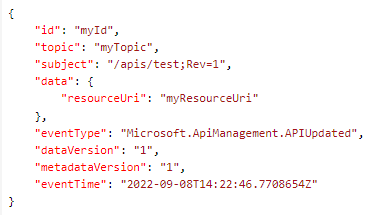I need some help Parsing JSON Array in Azure APIM policy. My input to my API is a JSON Array but I want the output of the API to be JSON without the "[]", I just can't get the policy to remove them.
Here is the JSON Array input to my API:
[
{
"id": "myId",
"topic": "myTopic",
"subject": "/apis/test;Rev=1",
"data": {
"resourceUri": "myResourceUri"
},
"eventType": "Microsoft.ApiManagement.APIUpdated",
"dataVersion": "1",
"metadataVersion": "1",
"eventTime": "2022-09-08T14:22:46.7708654Z"
}
]
But I would like the Output of the policy to remove the square brackets [], like this:
{
"id": "myId",
"topic": "myTopic",
"subject": "/apis/test;Rev=1",
"data": {
"resourceUri": "myResourceUri"
},
"eventType": "Microsoft.ApiManagement.APIUpdated",
"dataVersion": "1",
"metadataVersion": "1",
"eventTime": "2022-09-08T14:22:46.7708654Z"
}
Here is my policy (which I copied from a tutorial and manipulated):
<policies>
<inbound>
<base />
<set-variable value="@(context.Request.Headers["Aeg-Event-Type"].Contains("SubscriptionValidation"))" name="isEventGridSubscriptionValidation" />
<set-variable value="@(context.Request.Headers["Aeg-Event-Type"].Contains("Notification"))" name="isEventGridNotification" />
<choose>
<when condition="@(context.Variables.GetValueOrDefault<bool>("isEventGridSubscriptionValidation"))">
<return-response>
<set-status code="200" reason="OK" />
<set-body>@{
var events = context.Request.Body.As<string>();
JArray a = JArray.Parse(events);
var eventGridData = a.First["data"];
var validationCode = eventGridData["validationCode"];
var jOutput =
new JObject(
new JProperty("validationResponse", validationCode)
);
return jOutput.ToString();
}</set-body>
</return-response>
</when>
<when condition="@(context.Variables.GetValueOrDefault<bool>("isEventGridNotification"))">
<send-one-way-request mode="new">
<set-url>https://hooks.slack.com/services/mySlackHandle</set-url>
<set-method>POST</set-method>
<set-body>@{
var events = context.Request.Body.As<string>();
JArray a = JArray.Parse(events);
var eventGridData = a.First["data"];
var song = eventGridData["song"];
return new JObject(
new JProperty("text", String.Format(" {1}",
song, a))).ToString();
}</set-body>
</send-one-way-request>
<return-response>
<set-status code="200" reason="OK" />
</return-response>
</when>
</choose>
</inbound>
<backend>
<base />
</backend>
<outbound>
<base />
</outbound>
<on-error>
<base />
</on-error>
</policies>
ANY HELP GREATLY APPRECIATED! Extra points if you can remove the reference to "song", which I cannot without breaking the policy...
